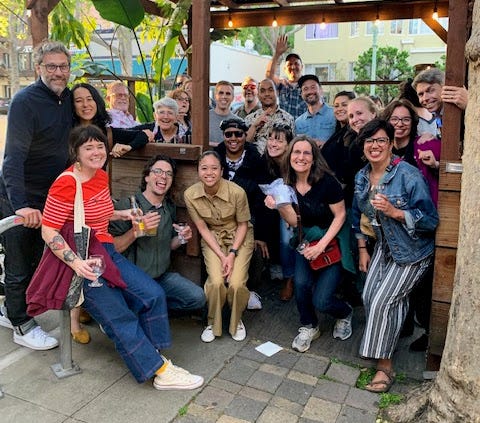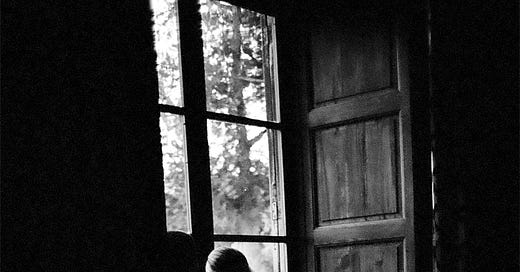#461: Wedding Colors
Articles on microaggressions, chronic fatigue, spin class, and dental veneers
Dear Loyal Readers,
I’m pleased to report that my busy time at work has begun to subside. Several of you reached out to check in; thank you for the kind words. There are no promises that my current state of calm will continue, of course. But I noticed that I had more time and space this week. It’s a good sign when I can do my regular thing of scouring hundreds of publications to find great articles for you.
I really like this week’s selections. The first two are about people being denied their humanity. The second two are about people striving to belong. In the lead article, “Wedding Colors,” a 24-year-old Brown woman attends a wedding in Arkansas involving a family member of her white boyfriend. In “On Believing,” a woman who suffers from incapacitating fatigue cannot find a doctor who believes her symptoms. In “Communion,” a lonely man in his 30s discovers his people in an exhausting spin class. And in “Jawbreakers,” young people seek acceptance by permanently sanding down their teeth’s enamel. (Myself, I’d prefer leg lengthening.)
Hope you enjoy this week’s articles. Some of you might like that they’re on the shorter side. As always, if a piece hits you, let me know. I’d love to hear from you. Or if you prefer, show your support by becoming a paid subscriber (like Johnny!).
⭐️ I warmly invite you to this month’s discussion of “What My Adult Autism Diagnosis Finally Explained.” Written by Mary H.K. Choi and published in The Cut, the article explores the author’s discovery at age 43 that she has autism. In case you missed last week’s issue, here’s more information about the piece, including my interview with Ms. Choi.
Interested? We’re meeting on Zoom on Sunday, September 29, 2:00 - 3:30 pm PT. It’d be great to see you there. All you need to do is sign up below. If you have questions, feel free to hit reply or email me here.
1️⃣ Wedding Colors
Chante Owens: “I was a Brown girl raised by a Black father and a Filipina mother, but I was brought up with whiteness. White people were my classmates, friends, coworkers, neighbors, and lovers. I spent most of my formative years so immersed in whiteness that I stopped seeing my Blackness — like a drop of coffee diluted in a bowl of milk. Slowly I convinced myself that I was one of them, that my skin color didn’t matter, that my Blackness went unseen. My delusion became my dwelling place, a giant bubble filtering the world through its iridescent lens.
“Somehow my bubble went unpunctured for twenty-four years, allowing me and my coffee-colored skin to arrive in Hartford, Arkansas, blissfully ignorant of what my Blackness might mean in this place.”
By Chante Owens • The Sun • 8 min • Gift Link
2️⃣ On Believing
Rachel Dlugatch: “Susan Sontag, in Illness as Metaphor, writes: ‘Everyone who is born holds dual citizenship, in the kingdom of the well and in the kingdom of the sick. Although we all prefer to use only the good passport, sooner or later each of us is obliged, at least for a spell, to identify ourselves as citizens of that other place.’
“I find Sontag’s metaphor compelling. But what she doesn’t mention is that you’re not born with both passports. Passports, of course, are issued when someone deems you meet the designated criteria, criteria that you had no part in writing, most likely. When you develop an invisible illness, one that evades healthcare professionals — or should we just call them gatekeepers? — you’re denied the identification that will gain you entry to the kingdom of the sick. Maybe that doesn’t sound so bad at first. As Sontag hints, most of us would prefer only to be citizens of the good place anyway.”
By Rachel Dlugatch • The Audacity • 12 min • Gift Link

3️⃣ Communion
Raleigh McCool: “My history of exercising — my history of being a boy, a Christian, a person — has been lived under the Sauron eye of shame. My high-school basketball coach screaming at me for missing shots. Pastors barking about hell and all the ways you might get there — cussing, drinking, being a sissy. No pain, no gain. Man up. Real men don’t cry. All sorts of ways shame has molded me like clay. When the looming drill sergeants of my life enforced compliance, dishing out love or what passed for it only if you earned it, I got good at earning it.
“In spin, I let go. There’s no earning it — because it’s already here. From the very first class, Karson and Meg and others snuck me in through a side door of vulnerability, built a safe little nook in which to practice being loved. You are welcome here and You belong. Belonging, whether your Apple Watch says you burned 600 calories or if you sat there and slowly pedaled in the dark. I’m a man who’s only ever earned. It’s how I learned to make people, parents, girlfriends, and God love me. To move in spin class only for the sake of moving, of the joyful challenge itself, of sweating and pushing and dancing, is cool water in my throat. To be loved, simply for showing up, is pure golden sun in my chest.”
By Raleigh McCool • Longreads • 13 min • Gift Link
4️⃣ Jawbreakers
Angelina Chapin: “The word veneer implies a surface-level intervention, an exterior casing, like a slipcover on a worn chair. But dental veneers are invasive medical prosthetics, and in many cases they alter patients’ teeth drastically and permanently. The most common form are porcelain veneers, which typically need to be glued onto a rough surface, created by shaving off a layer of the patients’ teeth. There is no dental procedure that can replace the lost enamel. Composite veneers, which allow for a resin to be applied directly onto teeth, can in theory avoid this damage, so long as there are no complications. In the very best cases, porcelain veneers need to be replaced every 15 to 20 years; composites last roughly half as long. But veneers done poorly are a different story altogether: They can lead to major and irreparable health consequences, including rotting teeth, gum infections and disease, TMJ disorders, and other chronic conditions, including unresolvable pain and degradation of the jawbone.
“Twenty years ago, these risks didn’t matter much for most people. Veneers were reserved for entertainment-industry stars, particularly actors; the very rich; and patients with significant dental problems. Today, these fake teeth are everywhere, especially online, and the market for the prosthetics has more than tripled, according to the dentists I spoke with, and is expected to grow by more than 70 percent by 2030. Dentists told me, this growth has been driven in good part by people in their late teens to mid-30s who do not have any obvious dental defects.”
By Angelina Chapin • The Cut • 18 min • Gift Link
Thank you for reading this week’s issue. Hope you liked it. 😀
To our 11 new subscribers — including John, Wauter, Prudence, Adarsh, and Sophie — I hope you find the newsletter a solid addition to your email inbox. Welcome to Article Club. Make yourself at home.
If you appreciate the articles, value our discussions, and in general have come to trust that Article Club will have better things for you to read than your current habit of scrolling the Internet for hours on end, please consider a paid subscription. I am very appreciative of Isabel, our latest paid subscriber. Thank you!
If subscribing is not your thing, don’t despair: There are other ways you can support this newsletter. Recommend the newsletter to a friend (thanks Jonathan!), leave a comment, buy me a coffee, or send me an email. I’d love to hear from you.
On the other hand, if you no longer want to receive this newsletter, please feel free to unsubscribe below. See you next Thursday at 9:10 am PT.








I wonder whether Rachel Dlugatch and her beau of 6-years are still together and kinda hope she’s moved on; while he may have been too gobsmacked in the moment to respond to his racist chum, his disappointment at not being at the “cool kids” table spoke additional volumes. As for the surge in dental veneers, I couldn’t help noticing all the Burberry ads throughout, offering concepts of ideal beauty only the starved and bullied can possibly achieve. And I was whispering “and also with YOU, Raleigh”—all the way to his realization the spin group had saved a seat for him. ❤️🩹